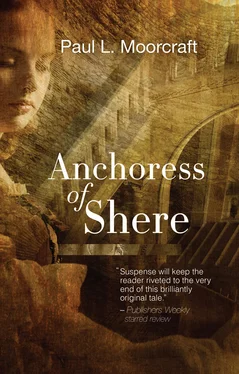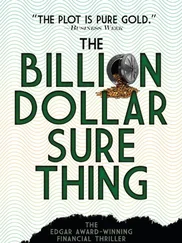Paul Moorcraft - The Anchoress of Shere
Здесь есть возможность читать онлайн «Paul Moorcraft - The Anchoress of Shere» весь текст электронной книги совершенно бесплатно (целиком полную версию без сокращений). В некоторых случаях можно слушать аудио, скачать через торрент в формате fb2 и присутствует краткое содержание. Жанр: Триллер, на английском языке. Описание произведения, (предисловие) а так же отзывы посетителей доступны на портале библиотеки ЛибКат.
- Название:The Anchoress of Shere
- Автор:
- Жанр:
- Год:неизвестен
- ISBN:нет данных
- Рейтинг книги:4 / 5. Голосов: 1
-
Избранное:Добавить в избранное
- Отзывы:
-
Ваша оценка:
- 80
- 1
- 2
- 3
- 4
- 5
The Anchoress of Shere: краткое содержание, описание и аннотация
Предлагаем к чтению аннотацию, описание, краткое содержание или предисловие (зависит от того, что написал сам автор книги «The Anchoress of Shere»). Если вы не нашли необходимую информацию о книге — напишите в комментариях, мы постараемся отыскать её.
The Anchoress of Shere — читать онлайн бесплатно полную книгу (весь текст) целиком
Ниже представлен текст книги, разбитый по страницам. Система сохранения места последней прочитанной страницы, позволяет с удобством читать онлайн бесплатно книгу «The Anchoress of Shere», без необходимости каждый раз заново искать на чём Вы остановились. Поставьте закладку, и сможете в любой момент перейти на страницу, на которой закончили чтение.
Интервал:
Закладка:
So far Christine had not looked at Sir Richard, whom she had always remembered in his fine linen and purple tunic. Above all she recalled his jewelled dagger. This day he was dressed in a simple black robe, with no adornments. His feet were chained together, his face was dirty, and his beard bedraggled. He had aged ten years in the two since last she saw him. Although her enclosure had honed her hatred, the period of intense devotions permitted some pity to enter her soul.
She recited the lines the bishop had instructed. “I swear to God and King that I verily speak unto ye this day.” She spoke quietly and nervously. “I am Christine of Shere, the daughter of William, also of Shere. I confirm the times the deposition states regarding Sir Richard’s offences against my person and against my sister Margaret, now deceased. I confirm that Sir Richard…” She stopped staring at the floor and looked into her tormentor’s face. The words died in her mouth.
The bishop’s lawyer poked her with his finger. “Proceed,” he said.
Christine continued: “He did…he did violate my chastity, by cruel force, and with no volition on my part. I had been betrothed to Simon, a tailor of Shere. In shame thereafter I did confess and was sworn by holy vows as an anchoress of St. James’s church. There was I bound by my vows for life until-I beg the holy Mother Church for forgiveness-I did break these vows. I did this to aid my sister who had been made victim of Sir Richard’s cruel lust for the months she had worked as scullery maid in Vachery Manor, the seat of Sir Richard. She was chaste until she was by Sir Richard employed. He and his son did by brute force violate my sister, and then she was with child-from their seed. She died in childbirth, and is now buried these three weeks past in Peaslake.”
She stopped and coughed a little as the bishop’s lawyer glared at her. “My father, William of Shere, did protest to Sir Richard,” she went on, hesitantly, “but was dismissed from his presence with threats. My father has no debts to his lord, and has honoured all the tallages and obligations. Sir Richard has brought shame on our house, humble though it be. He has scorned our local customs as well as laws of king and Mother Church.”
She spoke quietly and nervously, but she had delivered all that she had rehearsed. Nor had she lied, although she accepted that the bishop’s lawyers could tutor her in words more befitting the court.
The judge did not question her, but spoke in French to the bishop’s lawyer, saying, “You will translate this statement, taken in Latin, by our scribe, and this Christine of Shere will sign that it is a true account of her words sworn in this Court of Pleas.”
The bishop’s lawyer caught the sleeve of Christine’s robe to indicate that she must leave. As she turned, she looked back at Sir Richard. She expected to see the fire of anger in his eyes, but instead they were dull; like his face, they showed no emotion. She wondered whether torture had broken his spirit.
The abbess took her back to the convent in her carriage. She did not at first converse with Christine, who knew not to speak unless addressed by her superior. Christine felt a cold emptiness in her heart. There was no joy, but she had had her moment of justice.
Eventually the Abbess Euphemia spoke, and with tenderness: “Christine, you acted bravely and well. The bishop has granted you to stay with us until the trial is complete. You may be taken before a bishop’s court to be examined, to restore your vows if you are shriven well and are truly penitent. The bishop, I trust, will look with kindness on you. The King’s Assizes, I know, will restore the lands belonging to the Church. And you have acted to the bishop’s will.”
Christine stayed five more days in the convent, until the King’s Bench found Sir Richard guilty of all the charges. Although the king had not returned to the despotic ways of his father, the issue of Church land was dear to his benefactor, the Pope. It had been seven years since a knight had been thus dispossessed, for the king had need of noble support, not least for the wars in France and Scotland. For reasons of state, however, Sir Richard was stripped of all his chivalric rights. Knights were executed by beheading, but he was to be treated as a commoner.
On the appointed day, Christine was allowed to leave the abbey to join the common throng. The abbess insisted that Christine attend his hanging in the square, and she did not argue against the order.
As the abbess led Christine the short distance to the centre of the town, the townspeople respectfully stood back to let them pass. In the square, the crowd carried an effigy of Sir Richard on a pole, then burned it, and danced and sang round the flames.
After an hour or so of peasant revelries, Christine saw Sir Richard’s broken body dragged by four horses through the cobbled streets of Guldenford. Battered and bloodied, he was hauled, scarcely conscious, to the steps of the single gallows, ten feet high. The people hissed and booed at him, while the mob nearest him spat. Gobbets of spittle streaked his face and robe, decorated with his coat of arms, but reversed so that they would never again be worn by any courtly family. Upon his head they placed a crown of nettles.
Two hooded men dragged Sir Richard up the wooden steps and thrust his head roughly into the dangling noose. The once proud lord showed no emotion; he seemed beyond caring or, perhaps, beyond any further earthly pain.
The sheriff, after reading out a short proclamation in Latin and English, concluded: “Such be the fate of all who dare rebel against the king.”
The crowd roared back, “The king. The king. Death to all rebels against the king.”
Sir Richard, looking up at the grey, overcast skies, tried to speak. Although the crowd ceased their tumult all that Christine heard was, “I deny all these unjust accusations and I curse ye all…”
He was silenced by the shouts of the crowd, and stones were pelted at his broken body. Soldiers tried to push the mob back as the sheriff gave the order to hoist him up.
Christine saw his bowed body straighten and jerk up into the air until, in the utter silence of the throng, she heard a sharp choking sound at which the crowd broke into loud laughter. His body dangled and twitched for many minutes before it grew still and they let him drop.
To all this Christine forced herself to bear personal witness, but she closed her eyes as the sheriff himself lowered Sir Richard from the gallows; deliberately allowing a tiny ember of life to remain within his body. The two hooded men threw the blue-faced victim on to a small bench and tied him down. After his robe was cut off with a large meat cleaver, the sheriff took the cleaver and slashed downwards through the dying man’s stomach. He drew out the intestines and threw them on to a brazier. Still alive, Sir Richard, hearing and smelling the sizzling of his own innards, let out a groan like a dying ox.
The crowd did not shout for mercy, but the sheriff ordered one of the hooded men to wield the axe. After two strokes, Sir Richard’s head tumbled on to the platform. As the blood spouted from the neck, the crowd raised their voices. A peasant cried out, “Justice! Justice!”
The hooded men took turns to quarter the body with the axe as the crowd cheered at every cut. The four quarters of his body were swarmed over by the crowd. With knives they scratched on his skin, and chanted verses from the Holy Scriptures denouncing arrogance and evil. Some of the more drunken members of the mob, particularly the women, started to sing and dance again. At this the abbess led her charge away.
In her convent cell, Christine was too overcome to offer more than perfunctory prayers, but she did finally manage to sleep. She dreamed of floating down a river of blood until her little boat reached an island. The boat steered itself to the shore, where she was greeted by her sister, dressed all in the finest white linen. She stretched out both arms to embrace the dead girl…
Читать дальшеИнтервал:
Закладка:
Похожие книги на «The Anchoress of Shere»
Представляем Вашему вниманию похожие книги на «The Anchoress of Shere» списком для выбора. Мы отобрали схожую по названию и смыслу литературу в надежде предоставить читателям больше вариантов отыскать новые, интересные, ещё непрочитанные произведения.
Обсуждение, отзывы о книге «The Anchoress of Shere» и просто собственные мнения читателей. Оставьте ваши комментарии, напишите, что Вы думаете о произведении, его смысле или главных героях. Укажите что конкретно понравилось, а что нет, и почему Вы так считаете.












